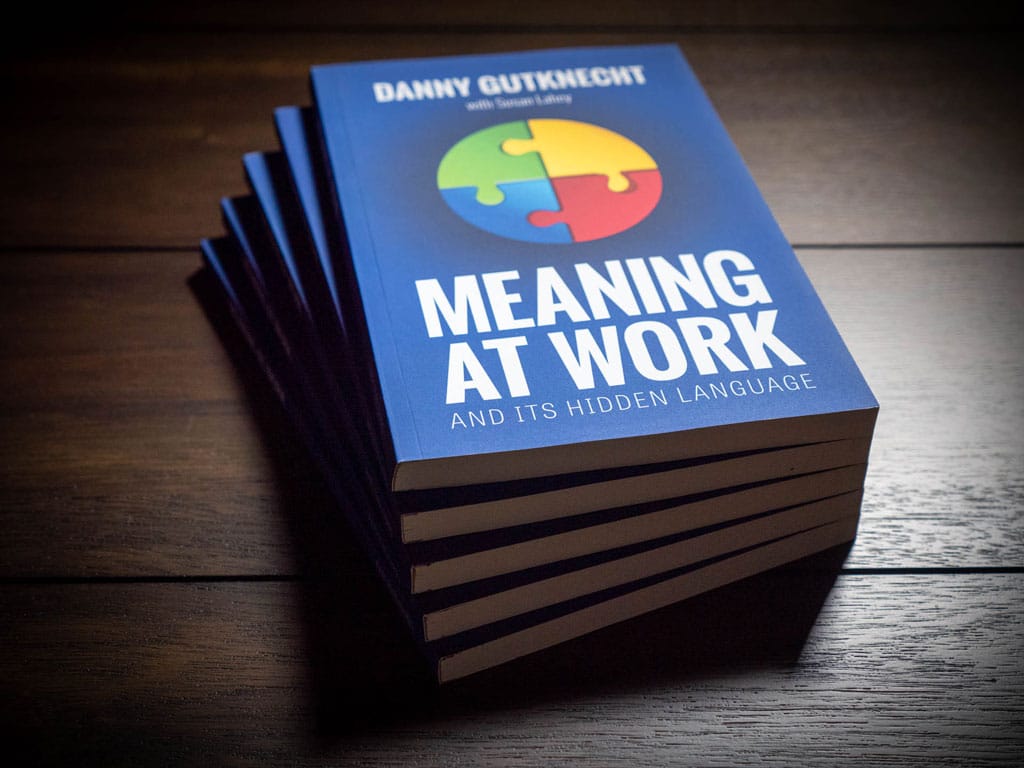Organizational Meaning Is Everyone’s Job

The universal search for meaning has entered the workplace at full throttle. Today’s employees see themselves as free agents in search of an authentic connection. They want more from work than simply a means for ensuring their basic needs are met. They have other needs to satisfy — the need to have meaning and purpose, to find inspiration and to tap their full potential.
If you’re a CEO trying to figure out how to provide meaningful work for your employees, relax. You can’t. In fact most efforts to engender “meaning” in the workplace fail for several reasons:
- Meaning isn’t a resource.The first team of an early stage company can catch a vision from the founders. But that model doesn’t work as you scale. It’s like trying to keep the tires full on a fleet of cars. You can do it with five, not with 50 or 500. Leaders often spend significant time and resources pumping up leaky tires. Today, while many people turn to a company or other authority to give them meaning, they are seldom satisfied with that external meaning model. It doesn’t resonate with them as individuals. Since it isn’t already in employees’ DNA, it must constantly be fueled from the outside. That’s not only unsustainable, but useless for driving performance.
- Meaning is personal.Meaning is the way we interpret our existence. Most people don’t want someone else’s interpretation. People spend a lifetime cultivating their ideas of what is meaningful. We are driven by what resonates with us, not what we are told should resonate with us. The search for meaning guides or challenges everything we do — work, hobbies, relationships. Only our own personal sense of meaning, derived from our own narratives, has the power to push us to overcome barriers, to ignore discomfort like late hours or fierce conversations, and to delve into all our resources to make the best decisions and take the right actions. If organizational meaning doesn’t connect profoundly with personal meaning, it’s immobile.
- High performers aren’t looking for substitute meaning.The people who perform exceptionally well and who innovate are those who have always done so, driven by their own internal meaning models. They have a strong sense of self and are unlikely to tap into groupthink of any kind — including organizational culture. Such people are individuators; not to be confused with individualistic. Those who are individualistic are seeing their uniqueness in terms of how it is juxtaposed against the culture. This is the hipster mentality of the current age, though it’s had different names in other generations. Individuators, on the other hand, aren’t thinking about how they compare to the culture. They know who they are, and know their skills, talents and weaknesses. They’re not focused on how others see them so much as what they can contribute from the unique configuration that comprises them. They use everything they do as a means to grow, better themselves and fulfill their potential.
It’s the people attempting to fit in, those who constantly seek peer or social validation, who are discontent and work contrary to what’s best for the organization.
- The organization has its own meaning journey.Every organization has a meaning journey, though often it’s not as clearly articulated as it could be. People are interacting with that meaning for their own reasons and sharing their meaning with it. This includes employees, customers and shareholders. Companies that have unique market advantages are those that have adapted and evolved their meaning while maintaining their essence. Shell Oil is one. Southwest Airlines is another. This is the meaning journey with which CEOs should be most concerned.

So what’s the solution?
Employees and customers are clamoring for the same thing: meaning, authenticity and a unique experience. In a world where so many things can be replicated, people don’t want to drink out of the same firehose as everyone else. They don’t want something superficial; they want something that moves them at their core.
Unfortunately, they often don’t understand that it must be their core, and not someone else’s, that makes that a reality. Even employees at a company with a longstanding and shared meaning model, like Patagonia, have their own reasons for being there, based in personal narratives. It’s the power of those narratives and the desire to fulfill a potential fueled by their experiences that leads them to perform. They were not evangelized from one meaning model to another.
But our society has generally given individuals poor tools for recognizing and manifesting individual meaning through work — the place where we spend most of our time. That’s why so many people try to find a place with a meaning like theirs already laid out. In such an operation they are initially enthused, but eventually grow disenchanted as the connection between the two seems to wear thin.
Learning to recognize and manifest what you find meaningful through the work you do requires skills and competencies that many people haven’t developed. Giving them meaning won’t help them develop it. Instead, CEOs need to focus on creating an environment where people are encouraged to explore the relationship between their meaning model and that of the organization. Most people come to an organization hoping to be able to fulfill their potential in some way, but often the structure of the organization and culture winds up being a disabler rather than an enabler.
In working with companies around the globe I’ve found that once the dialogue around the connection becomes part of the culture, employees get a glimpse of how their potential could be authentically served by really investing themselves into their work. This realization launches a self-perpetuating process that can transform an organization.
When employees are connecting the meaning of the organization to their own meaning, they’re tapping something truly unique, truly authentic, with the potential to contribute far more significantly to the organizational journey. Their journey and the organizational journey converge, with each helping the other evolve. This is a culture that is authentic through and through and can’t be replicated by anyone. It’s a competitive advantage that can’t be touched.
Have you read?
These are the countries with the Highest Average Salaries, 2022.
International Financial Centers Ranking, 2022.
How To Build Collaborative Learning Cultures by Tracey Ezard.
The Benefits of a Frictionless Strategy by Bill Price.
Work Smarter Not Harder: How To Reach Peak Efficiency With A Virtual Assistant by Lauren Gall and Melanie Ammerman.
Lee Rubin, CEO and Founder of Confetti on the Women Against Women narrative.
Dubai Investment Fund Continues to Seek Global Investment Opportunities.
Bring the best of the CEOWORLD magazine's global journalism to audiences in the United States and around the world. - Add CEOWORLD magazine to your Google News feed.
Follow CEOWORLD magazine headlines on: Google News, LinkedIn, Twitter, and Facebook.
Copyright 2025 The CEOWORLD magazine. All rights reserved. This material (and any extract from it) must not be copied, redistributed or placed on any website, without CEOWORLD magazine' prior written consent. For media queries, please contact: info@ceoworld.biz








